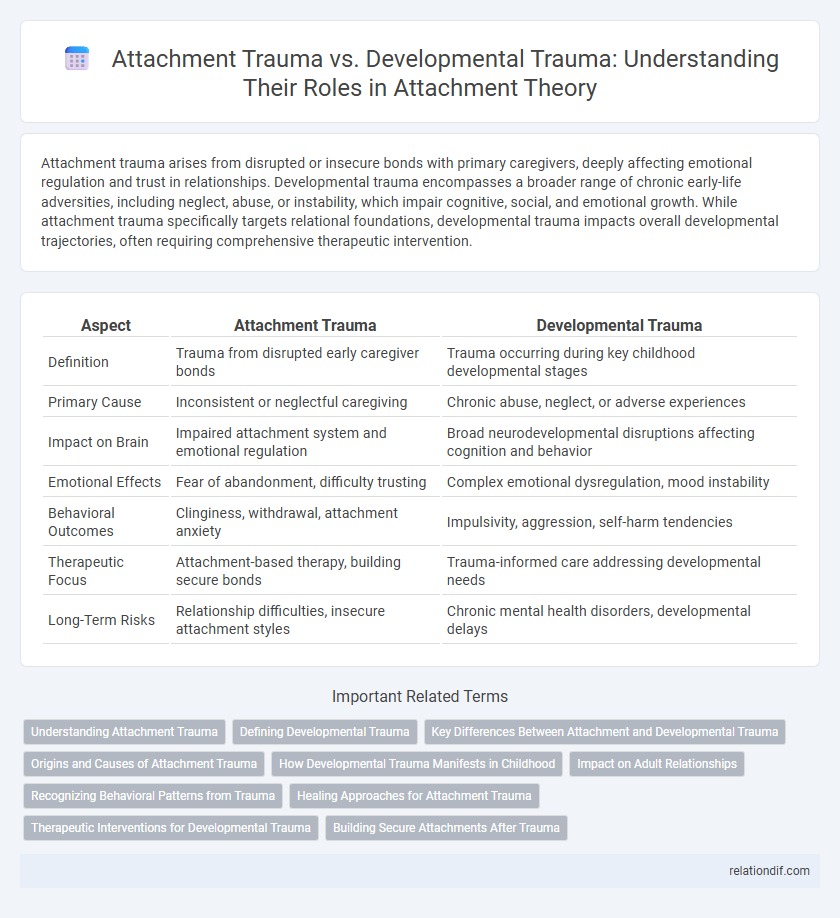Attachment trauma arises from disrupted or insecure bonds with primary caregivers, deeply affecting emotional regulation and trust in relationships. Developmental trauma encompasses a broader range of chronic early-life adversities, including neglect, abuse, or instability, which impair cognitive, social, and emotional growth. While attachment trauma specifically targets relational foundations, developmental trauma impacts overall developmental trajectories, often requiring comprehensive therapeutic intervention.
Table of Comparison
| Aspect | Attachment Trauma | Developmental Trauma |
|---|---|---|
| Definition | Trauma from disrupted early caregiver bonds | Trauma occurring during key childhood developmental stages |
| Primary Cause | Inconsistent or neglectful caregiving | Chronic abuse, neglect, or adverse experiences |
| Impact on Brain | Impaired attachment system and emotional regulation | Broad neurodevelopmental disruptions affecting cognition and behavior |
| Emotional Effects | Fear of abandonment, difficulty trusting | Complex emotional dysregulation, mood instability |
| Behavioral Outcomes | Clinginess, withdrawal, attachment anxiety | Impulsivity, aggression, self-harm tendencies |
| Therapeutic Focus | Attachment-based therapy, building secure bonds | Trauma-informed care addressing developmental needs |
| Long-Term Risks | Relationship difficulties, insecure attachment styles | Chronic mental health disorders, developmental delays |
Understanding Attachment Trauma
Attachment trauma occurs when early caregiving relationships are disrupted, causing difficulties in forming secure emotional bonds, unlike developmental trauma which encompasses a broader range of adverse childhood experiences impacting overall growth. Understanding attachment trauma involves recognizing patterns of emotional neglect, inconsistent caregiving, or abuse that interfere with the development of trust and safety in relationships. Effective interventions target rebuilding secure attachments through therapeutic techniques that enhance emotional regulation and relational skills.
Defining Developmental Trauma
Developmental trauma refers to chronic exposure to adverse experiences during critical periods of a child's growth, affecting brain development and emotional regulation. Unlike attachment trauma, which centers on disruptions in the caregiver-child bond, developmental trauma encompasses a broader range of stressors including neglect, abuse, and environmental instability. This type of trauma often results in complex behavioral and cognitive difficulties that persist into adulthood.
Key Differences Between Attachment and Developmental Trauma
Attachment trauma primarily arises from disruptions or neglect in early caregiver relationships, affecting emotional bonding and trust, whereas developmental trauma encompasses a broader range of chronic childhood adversities--including abuse and neglect--that impact overall psychological and neurological development. Key differences include attachment trauma's specific focus on caregiver-child relational damage, leading to issues like insecure attachment styles and difficulty in forming healthy relationships. Developmental trauma, by contrast, results in widespread effects such as impaired emotional regulation, cognitive delays, and increased risk for mental health disorders like PTSD and complex trauma.
Origins and Causes of Attachment Trauma
Attachment trauma originates primarily from disruptions in early caregiver relationships, such as inconsistent, neglectful, or abusive parenting during critical developmental periods. Unlike broader developmental trauma, attachment trauma specifically stems from unmet needs for safety, security, and emotional connection within primary attachment figures, leading to long-term difficulties in trust and emotional regulation. These early relational injuries fundamentally shape the individual's ability to form stable, healthy attachments throughout life.
How Developmental Trauma Manifests in Childhood
Developmental trauma in childhood manifests through persistent emotional dysregulation, impaired social skills, and cognitive delays, often stemming from chronic neglect or abuse within primary caregiving relationships. Symptoms include difficulty forming secure attachments, heightened anxiety, and behavioral challenges such as aggression or withdrawal. These manifestations disrupt normal brain development, impacting areas responsible for emotional regulation and executive functioning.
Impact on Adult Relationships
Attachment trauma disrupts the ability to form secure emotional bonds, leading to difficulties with trust and intimacy in adult relationships. Developmental trauma affects emotional regulation and self-worth, often resulting in patterns of avoidance or dependency. Both types of trauma contribute to challenges in maintaining healthy, stable partnerships due to impaired attachment styles and unresolved emotional wounds.
Recognizing Behavioral Patterns from Trauma
Attachment trauma often results in difficulties forming secure relationships, manifesting as clinginess, avoidance, or intense fear of abandonment, while developmental trauma typically leads to chronic emotional dysregulation, impaired self-worth, and difficulties with trust. Recognizing behavioral patterns such as hypervigilance, emotional numbing, or reactive aggression helps distinguish between attachment-related disruptions and broader developmental impacts. Early identification of these behaviors facilitates targeted therapeutic interventions that address the specific neurobiological and emotional consequences of each trauma type.
Healing Approaches for Attachment Trauma
Healing approaches for attachment trauma emphasize building secure relationships through consistent emotional support and therapeutic interventions such as attachment-based therapy and trauma-informed care. Techniques like Eye Movement Desensitization and Reprocessing (EMDR) and somatic experiencing help process relational wounds and regulate physiological responses tied to early attachment disruptions. Creating a safe therapeutic environment facilitates rewiring attachment patterns and fostering resilience in individuals affected by attachment trauma.
Therapeutic Interventions for Developmental Trauma
Therapeutic interventions for developmental trauma prioritize establishing safety and trust through trauma-informed care and stable attachment relationships. Techniques such as somatic experiencing, eye movement desensitization and reprocessing (EMDR), and trauma-focused cognitive behavioral therapy (TF-CBT) are specifically tailored to address complex emotional dysregulation and impaired self-worth common in developmental trauma. Integrating neurodevelopmental approaches enhances emotional regulation and relational skills, promoting healing from early childhood attachment disruptions.
Building Secure Attachments After Trauma
Building secure attachments after trauma involves understanding the distinct impacts of attachment trauma and developmental trauma on emotional regulation and trust formation. Therapeutic interventions emphasizing consistent, empathetic attunement help rewire neural pathways disrupted by early adverse experiences, fostering safety and connection in relationships. Establishing predictable caregiving environments supports resilience, enabling individuals to reconstruct secure internal working models essential for healthy relational bonds.
Attachment trauma vs developmental trauma Infographic

 relationdif.com
relationdif.com